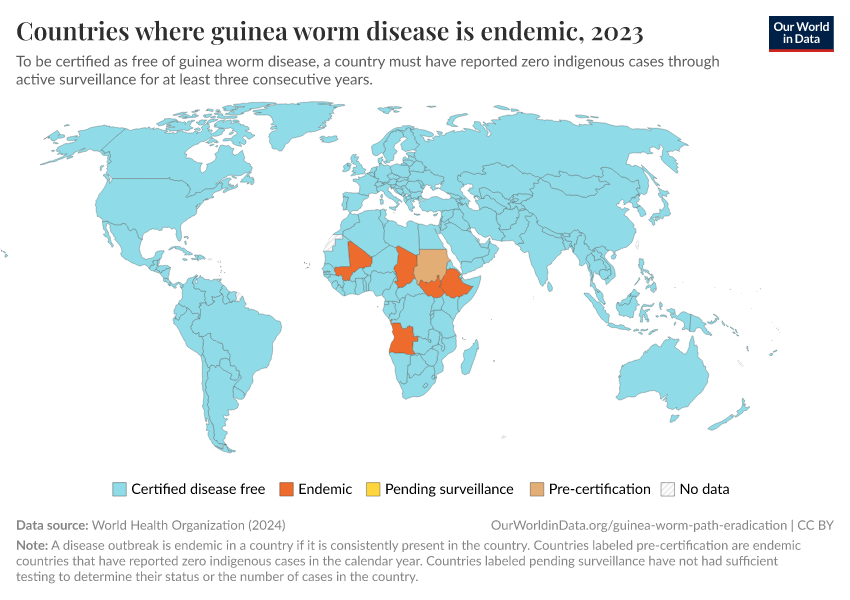Countries where guinea worm disease is endemic

What you should know about this indicator
- A country has to have no cases of guinea worm disease for three years while being actively surveilled to be "certified disease free".
- A disease outbreak is endemic in a country if it is consistently present in the country. Countries labeled pre-certification are endemic countries that have reported zero indigenous cases in the calendar year. Countries labeled pending surveillance have not had sufficient testing to determine their status or the number of cases in the country.
Related research and writing
What you should know about this indicator
- A country has to have no cases of guinea worm disease for three years while being actively surveilled to be "certified disease free".
- A disease outbreak is endemic in a country if it is consistently present in the country. Countries labeled pre-certification are endemic countries that have reported zero indigenous cases in the calendar year. Countries labeled pending surveillance have not had sufficient testing to determine their status or the number of cases in the country.
Sources and processing
This data is based on the following sources
World Health Organization (2018)
Certification status of dracunculiasis eradication: World Health Organization; 2018. Licence: CC BY-NC-SA 3.0 IGO
How we process data at Our World in Data
All data and visualizations on Our World in Data rely on data sourced from one or several original data providers. Preparing this original data involves several processing steps. Depending on the data, this can include standardizing country names and world region definitions, converting units, calculating derived indicators such as per capita measures, as well as adding or adapting metadata such as the name or the description given to an indicator.
At the link below you can find a detailed description of the structure of our data pipeline, including links to all the code used to prepare data across Our World in Data.
Notes on our processing step for this indicator
The current and historical values for the status of Guinea worm disease (Dracunculiasis) as certified by the WHO. To be certified as free of guinea worm disease, a country must have reported zero indigenous cases through active surveillance for at least three consecutive years. Data regarding certification status is available at the WHO: https://web.archive.org/web/20211024081702/https://apps.who.int/dracunculiasis/dradata/html/report_Countries_t0.html We have added the recent changes to Guinea worm disease certification: - Angola has had endemic status since 2020: https://www.who.int/news/item/23-09-2020-eradicating-dracunculiasis-human-cases-and-animal-infections-decline-as-angola-becomes-endemic - Kenya was certified guinea worm free in 2018: https://www.who.int/news/item/21-03-2018-dracunculiasis-eradication-south-sudan-claims-interruption-of-transmission-in-humans - DRC was certified guinea worm free in 2022: https://www.who.int/news/item/15-12-2022-the-democratic-republic-of-the-congo-certified-free-of-dracunculiasis-transmission-by-who
Reuse this work
- All data produced by third-party providers and made available by Our World in Data are subject to the license terms from the original providers. Our work would not be possible without the data providers we rely on, so we ask you to always cite them appropriately (see below). This is crucial to allow data providers to continue doing their work, enhancing, maintaining and updating valuable data.
- All data, visualizations, and code produced by Our World in Data are completely open access under the Creative Commons BY license. You have the permission to use, distribute, and reproduce these in any medium, provided the source and authors are credited.
Citations
How to cite this page
To cite this page overall, including any descriptions, FAQs or explanations of the data authored by Our World in Data, please use the following citation:
“Data Page: Countries where guinea worm disease is endemic”, part of the following publication: Esteban Ortiz-Ospina and Max Roser (2016) - “Global Health”. Data adapted from World Health Organization. Retrieved from https://archive.ourworldindata.org/20250909-093708/grapher/progress-towards-guinea-worm-disease-eradication.html [online resource] (archived on September 9, 2025).How to cite this data
In-line citationIf you have limited space (e.g. in data visualizations), you can use this abbreviated in-line citation:
World Health Organization (2025) – with major processing by Our World in DataFull citation
World Health Organization (2025) – with major processing by Our World in Data. “Countries where guinea worm disease is endemic – WHO” [dataset]. World Health Organization, “Certification status of dracunculiasis eradication” [original data]. Retrieved January 2, 2026 from https://archive.ourworldindata.org/20250909-093708/grapher/progress-towards-guinea-worm-disease-eradication.html (archived on September 9, 2025).